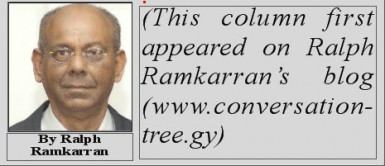
When appointed, the new Commissioner will recognize that without the cooperation of the public who provide information and intelligence, the capacity of the police to solve crime would be severely diminished. It appears that such cooperation was significantly enhanced during the tenure of Commissioner Seelall Persaud. This saw a heightened crime resolving effort by the police which deteriorated as soon as the police came under public attack at the recent inquiry and the negative consequences of that inquiry. It is hoped that under new leadership the police will revive its effort at good community relations which is recognized the world over as vital to crime-solving.
The new Commissioner of Police will also understand that good relations with the community depends on fair and balanced investigation of complaints by members of the public against the police. As far as the public is aware there are two bodies which are concerned with this area, namely, the Office of Professional Responsibility and the Police Complaints Authority. Their jurisdictions and mandates are not clearly delineated in the public mind.
My own experience with the Office of Professional Responsibility is that it exists solely for the purpose of protecting and defending the police. I have made a complaint and I have encouraged others who have had outrageous experiences with the police to complain. The results have been on every occasion a complete whitewashing of the behaviour of the police.
Recently, a young lady complained that she was made to completely undress and her body was invaded by police at the Ogle Airport in search of drugs. She had a credible complaint, including the request that she cough, before the intrusion. The complainant, a 17-year old, can hardly make that up. The ruling of the Office of Professional Responsibility, to which the matter has been referred, can be predicted from now. It will completely exonerate the police, and so long from now that the matter would have receded in the public consciousness. If the new Commissioner of Police believes that public support for the police is necessary for it to continue to enhance its ability to solve crime, he or she would act urgently to make this Office more credible and transparent by having known rules, by being outside the control of the police and by including members of the public.
Whilst the government continues to appoint persons in their eighties to constitutional offices, the position of Chair of the Police Complaints Authority has been vacant for about a year since the former Chairman was asked to retire because he was in his eighties.
Throughout his term of office Mr Kennard complained of lack of investigative capacity, under resourcing and dilatoriness of the police in responding to him. There appeared to have been some modest improvement before he was retired. It is hoped, firstly, that a person as credible and reputable as the former Chancellor, Mr Cecil Kennard, will be appointed to fill the vacant post as soon as possible. It is also hoped that the office will be fully resourced in financial, material and personnel terms (selected by the Chair) to enable it to carry out its functions in a timely manner. As far as the cooperation of the police goes, in the absence of statutory sanctions, which should be considered by the government, the new Commissioner will need to implement administrative sanctions where cooperation with the Police Complaints Authority is not treated as a priority by his officers.
Public confidence in the police is always a challenge. It took several years for the police to clamp down on carjackers. I needed to purchase a motor car recently to supplement my twenty-year-old vehicle, now long past its lifespan. I avoided those that are popular on the roads in order to reduce the possibility of being carjacked. That the police had the capacity to bring the scourge to an earlier end, at least temporarily, was clearly seen from the recent dismantling of the gang or gangs.
A similar situation currently exists, and has existed for many years, in relation to armed robberies generally and the robberies of persons who withdraw monies from banks. In the latter case, these persons, like overseas visitors, are followed to their homes or business places and robbed and sometimes shot, on occasion fatally. The public is awaiting a solution to this old and growing problem by a similar dismantling of the gang or gangs involved. Maybe one issue is the lack of intelligence from the public. If so, the police would do well to consider its relations with the public and the implementation of measures to improve those relations.
The police and the public






